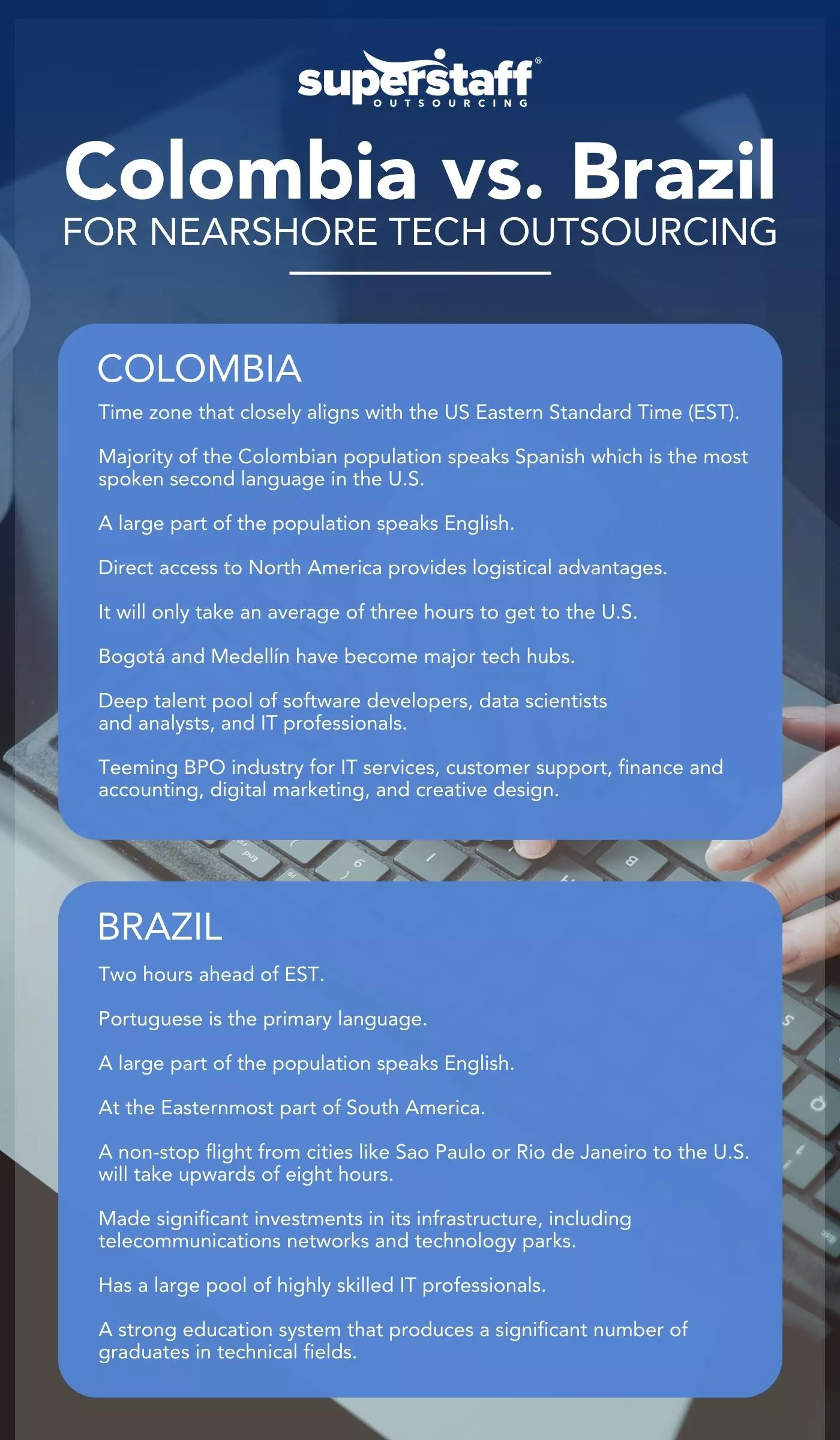
Colombia and Brazil have emerged as fierce contenders in the cutthroat world of Latin American tech nearshoring. With their competitive advantages, skilled workforces, and attractive climates, businesses from across the globe have sought out Colombia and Brazil for their vast potential of LatAm tech.
While the competition between these two countries adds dynamism and innovation to the region – driving tech advancements, fostering economic growth, and solidifying Latin America’s position as a significant player in the global tech industry – still, only one can claim the top spot.
With so many countries claiming to be the best, the question is what will emerge on top: Is it Colombia vs Brazil for nearshore tech outsourcing?
The Global Tech Crunch

Before we dive into it, let’s look at one of the significant factors fueling Latin American nearshore outsourcing – the global tech crunch.
Technology has drastically transformed the business landscape and as the digital era advances, the demand for tech workers will continue to soar. However, a recent study revealed that more than half (61%) of international IT executives cited skills shortage as the biggest challenge in the tech sector.
What’s fueling the talent gap? For decades, the industry has primarily drawn talent from a limited pool – 62% of tech workers are white, and 75% are male. Relying heavily on this homogeneous talent pool has created a huge blindspot in the tech job market.
While companies struggle to fill open positions, there are critical demographics that remain excluded from opportunities in the sector. By not tapping into the full potential of a diverse workforce, the industry misses out on different perspectives, experiences, and innovative ideas that can drive progress and success.
One strategic way to diversify talent and fill the skills gap is by offshoring to Latin America (LatAm), a growing tech hub with a massive pool of tech professionals.
Why Nearshore in Colombia?
Over the years, Colombia has established itself as a key player in the Latin American nearshoring market. With its strategic location and a rapidly-growing tech sector, the country is an ideal destination for companies looking to outsource their tech needs. Its business-friendly environment, and rapidly growing IT sector have also contributed to the success of companies looking to outsource their technology needs and software development to Colombia.
It has secured the top position in the Offshore BPO Confidence Index for two consecutive years, establishing itself as a frontrunner in the realm of tech outsourcing.
Here are the factors behind the growth and success of Colombia’s BPO market:
Geographic Location
Colombia strategically shares borders with five countries and has direct access to major international markets.
It is also the only country in South America with coastlines on both the Caribbean Sea and the Pacific Ocean, which gives it access to major international shipping routes and makes it a crucial maritime gateway between North and South America.
Additionally, it also serves as a land bridge between both continents, allowing for seamless regional integration, land transportation, and trade routes for Latin American BPOs and their North American clients.
Language Skills
One of the key advantages of nearshoring to the country is the proficiency of its workforce in the English language. English is widely taught in Colombian schools and universities, which is why their workforce is often bilingual, ideal for communication and collaboration with English-speaking clients and partners.
Colombia boasts an impressive educational landscape with 287 universities and over 3.8 million enrolled students. Renowned higher education institutions like Los Andes University, the National University, and the University of Antioquia have gained international recognition for their exceptional programs in fields such as engineering and business.
Cost-Effectiveness
Another advantage of Colombian nearshoring is that it has more competitive labor costs and lower costs of living compared to Western markets. As such, companies that nearshore in the country can benefit from significant cost savings while elevating the quality of the services they provide.
Government Support
Their government has also taken steps to simplify and streamline administrative processes for the BPO sector, such as reducing bureaucracy and implementing electronic systems for business registration and licensing. These measures aim to make it easier for companies to establish and operate their businesses in Colombia.
The public sector also established special economic zones (SEZs) that offer additional incentives and benefits to companies to attract investment and stimulate economic growth in specific regions. Additionally, Colombia has dedicated agencies, such as ProColombia and Invest in Bogota, that actively promote investment opportunities and support foreign companies interested in outsourcing their operations to the country.
The Colombian government has also made significant progress in terms of security and stability, which has boosted its reputation as a safe outsourcing destination.
Growing IT Sector
Colombia’s IT industry has experienced significant growth in recent years, fostering a deep talent pool of skilled professionals in areas such as software development services, data science outsourcing, and IT.
Infrastructure
When it comes to tech infrastructure, Colombia has already made significant strides in establishing a well-developed, fiber-optic network that provides high-speed internet connectivity, facilitating efficient communication and data transfer to maintain seamless connectivity between the BPO sector and their nearshore clients.
The country also has established technology parks and innovation clusters that serve as hubs for technology-driven companies. Not only do these parks provide state-of-the-art infrastructure and facilities, they also create a conducive environment for BPO companies to set up their operations and leverage advanced technologies.
Diverse Outsourcing Services
Colombia offers a wide range of outsourcing services, including IT services, customer support, finance and accounting, digital marketing, and creative design. This diversification allows companies to find suitable solutions for their specific outsourcing requirements.
Nearshore Outsourcing: Brazil
Brazil is yet another powerhouse in the tech nearshore South America landscape. With a massive and diverse market, this Latin American country offers businesses a wealth of opportunities and resources for US clients. Here are some key advantages of choosing the country as a nearshore destination.
Skilled Workforce
Brazil has a large pool of highly skilled IT professionals. The country has a strong education system that produces a significant number of graduates in technical fields every year. Brazilian professionals are known for their technical expertise, innovation, and problem-solving skills.
Language Proficiency
Brazil boasts a considerable English-speaking population, which is crucial for effective communication with clients in English-speaking countries. Language proficiency is an essential factor when considering outsourcing destinations, and Brazil’s proficiency in English is a significant advantage.
Cultural Compatibility
Tech professionals and developers from Brazil are known for their cultural compatibility with Western countries, especially the United States. This cultural affinity helps in bridging the cultural and communication gaps that can arise in outsourcing projects.
Competitive Cost Advantage
While Brazil may not offer the lowest labor costs and cost of living in LatAm, it provides competitive rates compared to other nearshore and onshore outsourcing destinations like the United States and Western Europe.
Infrastructure and Connectivity
Brazil has made significant investments in its infrastructure, including telecommunications networks and technology parks. Major cities have reliable internet connectivity and modern office spaces, supporting seamless collaboration between clients and nearshore developers in Brazil.

Both Colombia and Brazil have emerged as prominent nearshoring destinations for tech companies due to their growing technology sectors and skilled workforce. However, here are some reasons why Colombia can be considered a better tech nearshoring destination than Brazil.
Parallel Time Zones
Businesses often choose to outsource to neighboring countries due to the benefits of seamless collaboration and real-time coordination, which help minimize project delays. Colombia, fortunately, shares a time zone that closely aligns with the US Eastern Standard Time (EST), facilitating efficient communication and work synchronization.
On the other hand, Brazil is two hours ahead of the EST, which may require additional considerations when it comes to coordinating activities and managing time differences.
Language Proficiency
While Portuguese is the primary language in Brazil, the majority of the Colombian population speaks Spanish, which is more widely spoken and understood globally. English proficiency levels in Colombia are also relatively high, making communication with English-speaking clients and teams easier.
Business-Friendly Environment
Colombia has made significant strides in recent years in terms of political stability and creating a business-friendly environment. The government has implemented policies to promote foreign investment and entrepreneurship, offering incentives and support for tech companies.
ProColombia, the country’s investment promotion agency, received accolades for its efforts in lobbying the government for favorable BPO regulations. Investors and stakeholders highlight the agency’s instrumental role in fostering a conducive environment for outsourcing.
Colombia’s law enforcement is also commended for its trustworthiness, and efficiency in ensuring the safety of BPO employee commuters and improving overall peace and order.
When it comes to commercial property, arriving BPOs face no major hurdles in buying, leasing, or retrofitting spaces in Colombia. Confidence in the property market is high across the board, including in the country’s second-tier and third-tier cities, although some respondents note the need for additional investment to bring properties in these locations up to par.
Proximity to North America
Colombia’s geographical location, with direct access to North America, provides logistical advantages for companies looking to establish nearshore operations. It can result in shorter travel distances, reduced travel costs, and easier coordination of on-site visits.
Meanwhile, Brazil is at the Easternmost part of South America. A non-stop flight from cities like Sao Paulo or Rio de Janeiro to the US will take upwards of eight hours. For Colombia, it will only take an average of three hours.
Established Tech Ecosystem
Colombia has developed a robust tech ecosystem with numerous technology parks, incubators, and accelerators. Cities like Bogotá and Medellín have become major tech hubs, fostering innovation and collaboration among startups, established companies, and academic institutions.
BPO leaders have already engaged in meaningful discussions with President Petro, Colombia’s first leftist president, to address critical issues, initiate reforms, and shape the country’s future in the tech outsourcing industry.
Competitive Costs
Colombia also offers a more significant cost advantage compared to Brazil.
While labor costs in Brazil can be higher, Colombia provides competitive rates for skilled IT professionals, making it a better option for cost-conscious companies.
Colombia vs Brazil for Nearshore Tech Outsourcing
Experience the complete spectrum of advanced technology services provided by SuperStaff and unlock your business’s growth potential by leveraging Colombia’s strong position as a formidable player in the tech outsourcing industry. The Latin American hub offers high-quality tech solutions at a competitive cost, making it the best choice for businesses seeking to optimize their operations, without compromising quality.
Partner with SuperStaff and tap into the expertise of Colombian tech outsourcing, enabling your business to thrive in the rapidly evolving digital landscape.






